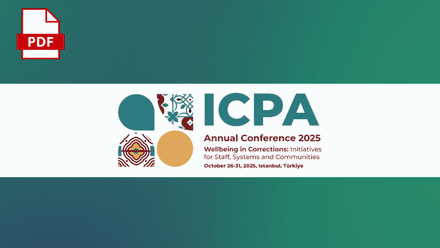Looking back at the first-of-its-kind: IPIC 2024 presentations are now available!
_______________________________________________________________
Background
The three-day conference, held from April 24-26, brought together over 230 attendees from more than 50 countries. Participants included representatives from academia, private, and public sectors such as prison services, non-governmental organisations (NGOs), and various governmental departments, reflecting a diverse array of sectors committed to the future of prison infrastructure.
IPIC kicked off with a unique opportunity for attendees to visit several notable prisons in Istanbul. Participants had the chance to explore Sakarya L Type Closed Prison, operational since 2022, and a look within the Sakarya Prisons Campus, which houses four different prisons. Amongst other prisons, attendees also had the chance to see the Marmara Women Closed Prison and Marmara Open Type Prison, known for their specialised accommodations for mothers with children. Other attendees took the rare opportunity to look at Ümraniye T Type Closed Prison, operational since 2010. These visits offered a valuable glimpse into the diverse and modern prison facilities in Türkiye.
Key Themes and Highlights
- Innovative Designs for Correctional Facilities
- The sessions showcased how modern architectural practices can enhance the functionality and aesthetics of prisons. Innovative design principles are key to creating more humane and effective correctional environments, improving the quality of life for inmates and staff, and supporting rehabilitation.
- Integration of Advanced Technology
- One of the highlights of the conference was the joint plenary, a special session where four experts in prison architecture and technology shared their insights. These discussions focused on aligning prison design with technology integration, a crucial factor in modernising correctional facilities and enhancing their functionality and security. The experts discussed how thoughtful design and advanced technology could significantly improve the living conditions within prisons, thereby aiding in the rehabilitation process and reducing recidivism.
- Architecture’s Role in Rehabilitation and Recidivism Reduction
- Speakers emphasised the role of prison infrastructure in rehabilitation efforts, discussing how the physical environment impacts inmate behavior and outcomes. Presentations highlighted the social responsibility of architecture in custodial facilities.
- Importance of Environmental Aspects
- Sessions at IPIC underscored the impact of the built environment on inmate rehabilitation and reintegration. The importance of green space was discussed, noting its role in improving the well-being of prisoners and staff, reducing violence, and supporting better post-custody outcomes. Discussions also covered prison architecture from the past to the present and various related research studies.
- Sustainable Goals and Retrofitting Existing Facilities
- There was a significant focus on retrofitting existing prison facilities to meet sustainable goals. Discussions explored strategies for achieving environmental sustainability in prison construction and maintenance, emphasizing the need to adapt current structures to be more energy-efficient and environmentally friendly.
IPIC was a key event highlighting the role of modern infrastructure in improving correctional facilities. The conference gathered experts, policymakers, practitioners, and other experts in the field to discuss the latest advancements in prison design, infrastructure, and technology. It focused on creating humane and rehabilitative environments. The knowledge shared and connections made at IPIC will help drive the modernisation of prison facilities, making them more effective and just.

